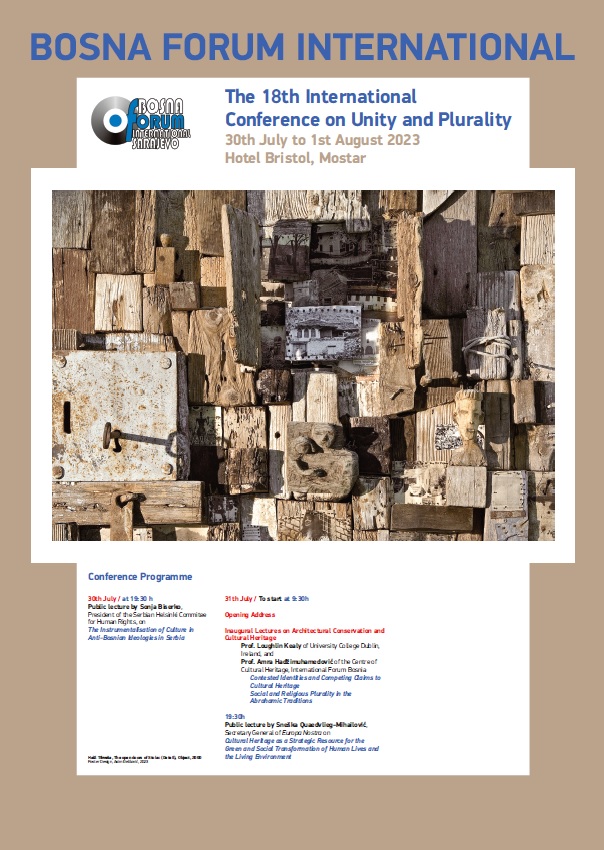18th International Conference on Unity and Plurality in Europe

The 18th International Conference on Unity and Plurality will be held in Mostar from the 30thof July to 1st of August. The Conference is a global initiative that has, since its inception 18 years ago, represented a unique combination of pluralist perspectives, social scientific research, religious thought on tolerance, civil society, cultural heritage, and identities, and on their interpretation and deployment in modern and traditional public life.
The 18th International Conference on Unity and Plurality will comprise two panels of leading academics and experts on the topics from Bosnia and around the world, as well as two inaugural and two evening public lectures in the fields being discussed at this year’s conference.
The first panelwill be on Contested Identities and Competing Claims to Cultural Heritage
Identity is intimately connected to culture and so to cultural heritage – the symbolic crystallisation of values and practices in the physical buildings, objects, and activities that form the nodal points around which the fabric of a living culture is woven and rewoven. It is in relation to these symbolic nodes that we negotiate, as individuals and communities, the constant processes of adaptation so characteristic of modern life, with its ever-changing and globalising environments. Official recognition as heritage of significance plays an especially important role in this, as it expresses our fundamental relationships to the polities that provide the frameworks for our individual and group lives. Culture and more specifically cultural heritage thus anchor and mediate our identities as active engagement in or disengagement from our social worlds and help us manage the dynamics of societal, economic, and lived change. It is consequently important that officially-recognised cultural heritage does actually serve to express and strengthen both the inclusivity and the internal articulation of our societies as plural wholes.
The same qualities that allow heritage to play such a potent role in the construction, maintenance, management, and reconstruction of identity also make it a key symbolic resource and an inherently contested category whose multiple meanings have to be negotiated both within and between coexisting and, all too often, competing groups. These processes are not always smooth and can result in heritage becoming a medium for competing identity claims and the target of exclusionary discourses and destructive campaigns. Attacking, eradicating, redefining, appropriating, and assimilating a group’s durable symbolic anchors and forms of expression are ways of undermining its coherence, functional capacities, status, and ultimately even its continued existence, while at the same time boosting that of one’s own group or of its leadership and power relations within it. On the other hand, a retreat into calcified and rebarbative forms of cultural conservativism and the transformation of heritage into identity emblems serves to harden group boundaries and replaces identity construction and individuation within a living cultural framework with a focus on identity emblems and cultural simulacra. This can be addressed by conscious and concerted attempts to restore complexity and sedimentation to our discourses on heritage and heritage sites, promoting the recognition of hybridity and marginalised narratives within a context of absolute respect for the historical record and the established facts and a principled complementarity of approaches.
The second panelwill be on Social and Religious Plurality in the Abrahamic Traditions
The Abrahamic Traditions together represent the religious heritage of the majority of humankind and are emblematic of unity and plurality as universal features of human experience. Their shared descent from Abraham represents unity, while the different paths of development they have followed and their different interpretations of that common origin represent plurality. All these traditions include at their core a shared recognition of the unity that lies behind and underwrites contingent existence, the Oneness of the Divine, the role of prophecy as a key mechanism of the revelation of God, and the reality of return to the Principle as the purpose of existence. Each of the traditions has had to develop its own approach to social and religious plurality, however, both internally and with respect to the other branches of the Abrahamic community. This plurality can be expressed through respect for difference or through conflict and competing claims, especially with regard to places and objects that are sacred to more than one of the traditions. It is vital that dialogue be developed and maintained between the traditions precisely on these areas of closest contact because they are the most potent potential sources of antagonism and conflict. The same goes for practices and texts which have a common origin but have been developed in different ways by the traditions. Key examples include sacrifice, theosis, collective and individual salvation, and liturgical reasoning. It is imperative that these commonalities be explored in all their variety and variation, so that the traditions can see what they share and what makes each of them special, as mutual respect depends upon the recognition of difference and a refusal to reduce the other to a deficient copy of oneself. The logical place to start in this process is how the different traditions approach the question of social and religious plurality in the first place.
This year’s Inaugural Lectures will be given by the two world leading authorities in Architectural Conservation and Cultural Heritage
·Loughlin Kealy of University College Dublin
·Amra Hadžimuhamedović of the Centre for Cultural Heritage, International Forum Bosnia
The public lectures will take place during the evenings. Every year, the organizers choose two appealing topics related to the theme of the Conference and invite relevant speakers to talk on them.
This year’s public lectures will be:
·The Instrumentalisation of Culture in Anti-Bosnian Ideologies by Sonja Biserko – President of the Serbian Helsinki Committee for Human Rights, and
·Cultural Heritage as a Strategic Resource for the Green and Social Transformation of Human Lives and the Living Environment by Sneška Quaedvlieg-Mihailović – the Secretary General of Europa Nostra.



















 English
English